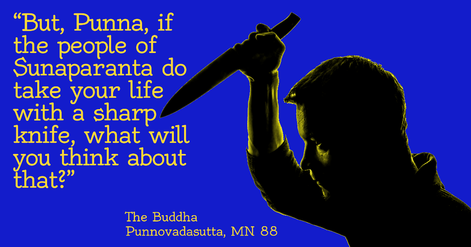 Puṇṇa Sutta Then the Venerable Puṇṇa approached the Blessed One … and said to him: “Venerable sir, it would be good if the Blessed One would teach me the Dhamma in brief, so that, having heard the Dhamma from the Blessed One, I might dwell alone, withdrawn, diligent, ardent, and resolute.” “Puṇṇa, there are forms cognizable by the eye that are desirable, lovely, agreeable, pleasing, sensually enticing, tantalizing. If a bhikkhu seeks delight in them, welcomes them, and remains holding to them, delight arises in him. With the arising of delight, Puṇṇa, there is the arising of suffering, I say. There are, Puṇṇa, sounds cognizable by the ear … mental phenomena cognizable by the mind that are desirable, lovely, agreeable, pleasing, sensually enticing, tantalizing. If a bhikkhu seeks delight in them, welcomes them, and remains holding to them, delight arises in him. With the arising of delight, Puṇṇa, there is the arising of suffering, I say. “Puṇṇa, there are forms cognizable by the eye … mental phenomena cognizable by the mind that are desirable, lovely, agreeable, pleasing, sensually enticing, tantalizing. [61] If a bhikkhu does not seek delight in them, does not welcome them, and does not remain holding to them, delight ceases in him. With the cessation of delight, Puṇṇa, there is the cessation of suffering, I say. “Now that you have received this brief exhortation from me, Puṇṇa, in which country will you dwell?” “There is, venerable sir, a country named Sunāparanta. I will dwell there.” “Puṇṇa, the people of Sunāparanta are wild and rough. If they abuse and revile you, what will you think about that?”  51 One’s Own Mind On one occasion the Blessed One was dwelling at Sāvatthī in Jeta’s Grove, Anāthapiṇḍika’s Park. There the Blessed One addressed the bhikkhus: “Bhikkhus!” “Venerable sir!” those bhikkhus replied. The Blessed One said this: “Bhikkhus, a bhikkhu who is not skilled in the ways of others’ minds [should train]: ‘I will be skilled in the ways of my own mind.’ It is in this way that you should train yourselves. “And how is a bhikkhu skilled in the ways of his own mind? It is just as if a woman or a man, young, youthful, and fond of ornaments, would look at their own facial reflection in a clean bright mirror or in a bowl of clear water. If they see any dust or blemish there, they will make an effort to remove it. But if they do not see any dust or blemish there, they will be glad about it; and their wish fulfilled, they will think, ‘How fortunate that I’m clean!’ So too, self-examination is very helpful for a bhikkhu [to grow] in wholesome qualities. “[One should ask oneself:] (1) ‘Am I often given to longing [93] or without longing? (2) Am I often given to ill will or without ill will? (3) Am I often overcome by dullness and drowsiness or free from dullness and drowsiness? (4) Am I often restless or calm? (5) Am I often plagued by doubt or free from doubt? (6) Am I often angry or without anger? (7) Is my mind often defiled or undefiled? (8) Is my body often agitated or unagitated? (9) Am I often lazy or energetic? (10) Am I often unconcentrated or concentrated?’ “If, by such self-examination, a bhikkhu knows: ‘I am often given to longing, given to ill will, overcome by dullness and drowsiness, restless, plagued by doubt, angry, defiled in mind, agitated in body, lazy, and unconcentrated,’ he should put forth extraordinary desire, effort, zeal, enthusiasm, indefatigability, mindfulness, and clear comprehension to abandon those same bad unwholesome qualities. Just as one whose clothes or head had caught fire would put forth extraordinary desire, effort, zeal, enthusiasm, indefatigability, mindfulness, and clear comprehension to extinguish [the fire on] his clothes or head, so too that bhikkhu should put forth extraordinary desire, effort, zeal, enthusiasm, indefatigability, mindfulness, and clear comprehension to abandon those same bad unwholesome qualities. [94] “But if, by such self-examination, a bhikkhu knows: ‘I am often without longing, without ill will, free from dullness and drowsiness, calm, free from doubt, without anger, undefiled in mind, unagitated in body, energetic, and concentrated,’ he should base himself on those same wholesome qualities and make a further effort to reach the destruction of the taints.” Translation: © Bhikkhu Bodhi, The Numerical Discourses of the Buddha (Wisdom Publications, 2012) This selection from The Numerical Discourses of the Buddha by Bhikkhu Bodhi is licensed under a Creative Commons Attribution-NonCommercial-NoDerivs 3.0 Unported License. Based on a work at http://www.wisdompubs.org/book/numerical-discourses-buddha. Permissions beyond the scope of this license may be available at http://www.wisdompubs.org/terms-use. |

|
LocationMahamevnawa Buddhist Monastery Winnipeg at the Buddha Meditation Center Winnipeg 2610 St Mary’s Road, Winnipeg, MB R2N 4A2 204 869 5272 [email protected] We sometimes take photos of our events and post them on our website. If you would like us to take down any images you appear in across any of our platforms, please let us know and we will be happy to remove them. |
Learning
Quick Links
Our Branches
We gratefully recognize that our monastery rests on the traditional territory of Anishinaabeg, Cree, Oji-Cree, Dakota, and Dene peoples, and the homeland of the Métis Nation.
|
 RSS Feed
RSS Feed

